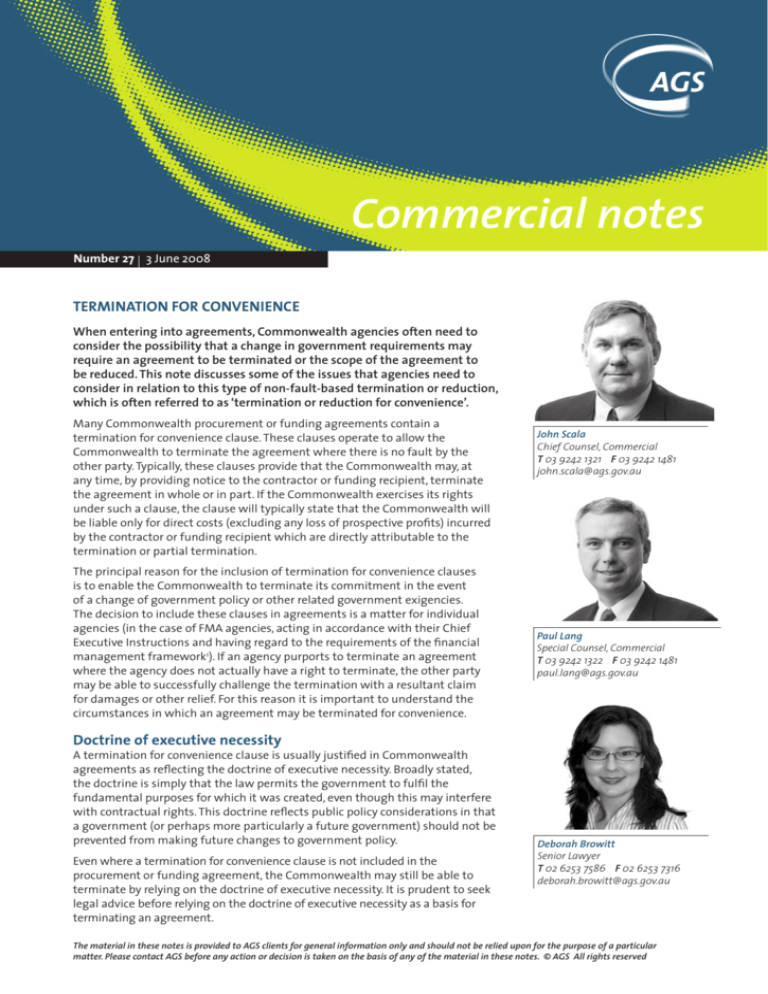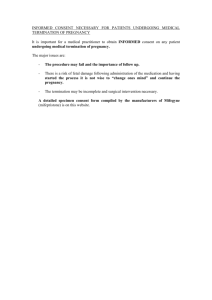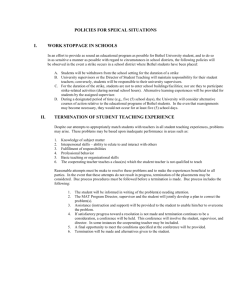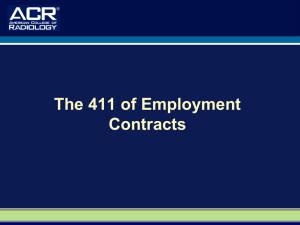
Australian Government Solicitor the leading lawyers to government
Commercial notes
Number 27 | 3 June 2008
TERMINATION FOR CONVENIENCE
When entering into agreements, Commonwealth agencies often need to
consider the possibility that a change in government requirements may
require an agreement to be terminated or the scope of the agreement to
be reduced. This note discusses some of the issues that agencies need to
consider in relation to this type of non-fault-based termination or reduction,
which is often referred to as ‘termination or reduction for convenience’.
Many Commonwealth procurement or funding agreements contain a
termination for convenience clause. These clauses operate to allow the
Commonwealth to terminate the agreement where there is no fault by the
other party. Typically, these clauses provide that the Commonwealth may, at
any time, by providing notice to the contractor or funding recipient, terminate
the agreement in whole or in part. If the Commonwealth exercises its rights
under such a clause, the clause will typically state that the Commonwealth will
be liable only for direct costs (excluding any loss of prospective profits) incurred
by the contractor or funding recipient which are directly attributable to the
termination or partial termination.
The principal reason for the inclusion of termination for convenience clauses
is to enable the Commonwealth to terminate its commitment in the event
of a change of government policy or other related government exigencies.
The decision to include these clauses in agreements is a matter for individual
agencies (in the case of FMA agencies, acting in accordance with their Chief
Executive Instructions and having regard to the requirements of the financial
management framework1). If an agency purports to terminate an agreement
where the agency does not actually have a right to terminate, the other party
may be able to successfully challenge the termination with a resultant claim
for damages or other relief. For this reason it is important to understand the
circumstances in which an agreement may be terminated for convenience.
John Scala
Chief Counsel, Commercial
T 03 9242 1321 F 03 9242 1481
john.scala@ags.gov.au
Paul Lang
Special Counsel, Commercial
T 03 9242 1322 F 03 9242 1481
paul.lang@ags.gov.au
Doctrine of executive necessity
A termination for convenience clause is usually justified in Commonwealth
agreements as reflecting the doctrine of executive necessity. Broadly stated,
the doctrine is simply that the law permits the government to fulfil the
fundamental purposes for which it was created, even though this may interfere
with contractual rights. This doctrine reflects public policy considerations in that
a government (or perhaps more particularly a future government) should not be
prevented from making future changes to government policy.
Even where a termination for convenience clause is not included in the
procurement or funding agreement, the Commonwealth may still be able to
terminate by relying on the doctrine of executive necessity. It is prudent to seek
legal advice before relying on the doctrine of executive necessity as a basis for
terminating an agreement.
Deborah Browitt
Senior Lawyer
T 02 6253 7586 F 02 6253 7316
deborah.browitt@ags.gov.au
The material in these notes is provided to AGS clients for general information only and should not be relied upon for the purpose of a particular
matter. Please contact AGS before any action or decision is taken on the basis of any of the material in these notes. © AGS All rights reserved
Australian Government Solicitor the leading lawyers to government
Drafting and negotiating the agreement
Obviously, it is important to consider what termination rights the agency
requires at the time the agreement is being drafted.
Illusory consideration?
It has been argued that a strict interpretation of a termination for convenience
clause would render an entire agreement void and therefore unenforceable.
This argument is based on the premise that, as the clause would permit the
government to terminate the agreement at any time at its convenience,
the government’s performance of its obligations is arguably ‘optional’: the
government promises nothing and thus provides no consideration for the
agreement; hence, there is no agreement.
The inclusion of the requirement for the Commonwealth to pay compensation
to the contractor or funding recipient upon termination mitigates against
this risk. Rather than rendering performance optional, the clause permits the
Commonwealth to decide how it will perform the agreement (either by seeing
the agreement through to the end or by paying the contractor compensation).
Consequently, it is unlikely that a court would find a procurement or funding
agreement void and unenforceable by virtue of the inclusion of a termination
for convenience clause.
Developing termination provisions
There are many factors that need to be considered in developing the termination
provisions to be included in an agreement. For simpler agreements, more
standard provisions may be adequate, but for more complex agreements it may
be necessary to tailor the termination provisions to the transaction. Examples of
some of the issues that may need to be considered are as follows.
Some issues to consider in developing the agreement
Ascertain whether your agency’s Chief Executive Instructions or other
internal procedures require the inclusion of a termination for convenience
clause in the relevant agreement. It can be helpful to refer to this
requirement if a potential contractor queries the inclusion of the clause��.
Whether the agency presses for a termination for convenience clause in
a particular agreement should be informed by the overall requirements
of the financial framework and, in the case of FMA agencies undertaking
procurements, against value for money criteria. For example, if the inclusion
of a termination for convenience clause will significantly increase the price
at which the contractor is prepared to enter into the agreement, this would
need to be weighed up against the benefit derived from the termination
right��.
Determine whether the agency requires a right to terminate for
convenience in whole or part. Consider the appropriateness of the
provisions in the event of a termination which results in a reduction of the
scope of the agreement. Ascertain what contractor actions and obligations
should continue in the event of a reduction of the scope of the agreement�.
One of the key reasons for including a termination for convenience clause
is to limit the compensation that is payable to a contractor in the event
that the termination proceeds; in particular, to focus the compensation on
the payment of reasonable costs following from the termination and avoid
the need to pay compensation for loss of future profits or other benefits.
Accordingly, it is important to carefully consider how the compensation is
described in the agreement. For example:
—��������������������������������������������
Is compensation for future profits excluded?
For more complex
agreements it may be
necessary to tailor the
termination provisions to
the transaction.
Commercial notes 3 June 2008
—�����������������������������������������������������������������������
Is there a limit on the maximum liability of the agency in relation to
direct costs (for example, to the unpaid balance of the agreement price
or, under a funding agreement, to the unpaid balance of the funds at
the time of termination)? If there is no limit, a claim might exceed the
cost of leaving the agreement afoot.
—�����������������������������������������������������������������
In the case of agreements which enable the contractor or funding
recipient to acquire assets from the procurement or funding payments,
how are those assets to be dealt with at the time of termination and is
this relevant to determining what compensation is payable?
—���������������������������������������������������������������
Consider the impact of payments to subcontractors in the event
of termination. To limit the direct costs unavoidably incurred by
a contractor in the event of termination for convenience, will the
contractor’s agreements with subcontractors be required to contain
provisions that the subcontract is terminated if the head contract is
terminated for convenience (with restrictions on any compensation
payable to the subcontractor)?
—�������������������������������������������������������������������
What mechanism will be needed to verify any claim for compensation
in the event of termination for convenience? Access to contractor records
and the ability to audit a compensation claim may be necessary to
determine the reasonableness of the contractor’s claim.
Consider the duration of the agreement: termination for convenience is
often a more significant consideration for longer-term agreements��.
Negotiating termination provisions
In negotiating the inclusion of a termination for convenience clause, it can
be useful to point out that the Commonwealth may still be able to terminate
by relying on the doctrine of executive necessity and that the payment of
compensation in such circumstances is not certain. In contrast, termination for
convenience clauses typically provide for the payment of compensation for loss
incurred as a result of the termination. However, in doing so, agencies should
take care not to represent that the right to terminate for convenience provided
in the agreement can or will be exercised only in limited circumstances (such as
where the doctrine of executive necessity would otherwise have been applicable
or where there is a major change in government policy), as, by making these
representations, agencies may inadvertently restrict the scope of the contractual
clause.
Must termination for convenience rights only be exercised
in good faith?
Agencies should
take care not to
represent that the
right to terminate for
convenience ... can or
will be exercised only in
limited circumstances ...
One of the issues that needs to be considered when determining whether to
terminate an agreement on the basis of a termination for convenience clause is
whether the clause can be taken at face value or whether there are limitations
on the agency’s right to terminate such that the exercise of the right to terminate
is not free from risk. In particular, is the agency required to act in good faith in
exercising a right to terminate? If so, what does that mean?
Is there an implied term requiring the parties to act in good faith?
There are no clear answers to this question under Australian case law. The
High Court has yet to endorse the implication of a term of good faith into a
commercial agreement.2
However, lower courts have endorsed the implication of a term of good faith, but
such a term has been implied in some cases as a matter of fact and in others as
a matter of law. Implication of the term in law has been on the basis that such a
term will ordinarily be implied in some, or perhaps all, commercial agreements
Australian Government Solicitor the leading lawyers to government
as a ‘legal incident of the relationship’.3 The result of implying the term in law is
that the term is implied into all contracts belonging to that class, although the
express terms of a particular contract can exclude it.
In contrast, the Victorian Court of Appeal seems to hold a preference for such a
term to be implied, if at all, in fact rather than in law, meaning that the implied
term of good faith is implied on an ad-hoc basis to give effect to the presumed
intention of the parties. Those who argue for a duty of good faith to be implied
as a matter of fact (i.e. on a case-by-case basis) argue that to imply a duty of
good faith as a matter of law (i.e. to all contracts in a particular class) would
undermine certainty in commercial contracting and ignore the traditional test
for an implied term, including that it be capable of clear expression and be so
obvious that it goes without saying. 4
In the recent Victorian Supreme Court case of Kellogg Brown & Root Pty Ltd v
Australian Aerospace Ltd [2007] VSC 200 (Kellogg), Hansen J commented that:
... perusal of the authorities reveals a deal of obiter on the issue. Further, the
High Court is yet to consider the issue. The question, of course, is whether in
the particular case in question the terms of the subject contract permit the
implication of the suggested term.
In this case, Australian Aerospace (AA) mirrored in its subcontract with Kellogg
Brown the termination for convenience clause which was in its own contract
with the Commonwealth. When AA exercised that right of termination for
convenience by giving Kellogg Brown a notice of termination, Kellogg Brown
contested the matter, arguing that the notice constituted a breach of an implied
term in that it was not given in good faith and reasonably, for just cause, or upon
proper and reasonable grounds. Judgment has not been given in this case. Once
it has, the issues of termination for convenience and the existence of a duty of
good faith implied in such clauses will hopefully be clearer.
Aside from the comments of Hansen J in Kellogg, recent cases in various
Australian jurisdictions have tended to proceed on the basis that there may
be implied, as a legal incident of a commercial contract, a term of good faith.
However, given that the position in Australian law (and particularly in Victoria) is
not clear, it may be that a duty to act in good faith is not to be implied generally
into all commercial agreements. Such a term would be implied only if the
particular facts and circumstances of the commercial arrangement required or
supported this.
Regardless of the uncertainty about whether such a term is to be implied and
if so how, agencies need to be aware of the risk that the exercise of the right to
terminate for convenience may be limited by a duty to act in good faith.
If there is a duty of good faith, what does it encompass?
If there is a duty to act in good faith in relation to a particular agreement,
whether expressly provided for or implied as discussed above, the scope of that
duty is also not entirely clear.
It would appear from authorities that reasonableness now seems to be
regarded as a significant ingredient of good faith and, in many cases, there is
little distinction made between the two concepts.5 Beyond the reasonableness
requirement, cases on the topic have not clarified the meaning of ‘good faith’
or its practical requirements but have suggested that good faith could perhaps
mean:
(a)�����������������
acting honestly
��������6
(b)�������������������������
not acting capriciously7 and
(c)�������������������������������������������������������������������������
�����������������������������������������������������������������������
doing what is necessary to enable the party to have the benefit of the
agreement.8
Agencies need to be
aware of the risk that
the exercise of the
right to terminate for
convenience may be
limited by a duty to act
in good faith.
Commercial notes 3 June 2008
It is equally unclear what circumstances would be found to constitute bad faith
or an abuse of discretion. Some have argued that using the power for an exterior
or ulterior purpose such as seeking a better commercial deal elsewhere, or to
avoid potential liability for default under the agreement or preventing other
parties from exercising their rights, would not comply with a duty of good
faith and fair dealing. If these arguments were upheld, it would mean that a
termination for convenience clause could not simply be used according to its
literal terms; that is, for the ‘convenience’ of the government.
Even if a good faith duty is expressly included in the agreement, the rights
under a termination for convenience clause will not necessarily be restricted.
Authorities have suggested that the duty of good faith is not a fiduciary duty
and will not prevent a contracting party from taking actions which promote its
legitimate interests and accord with express contractual terms.9 In particular,
such authorities have expressed the view that:
—an express term in an agreement that the parties would act in good faith did
not limit the operation of the termination for convenience clause
—a clear and unambiguous power of termination, expressed as an absolute and
uncontrolled discretion, is not required to be exercised reasonably merely by
virtue of the existence of a requirement to act in good faith
Even if a good faith
duty is expressly
included in the
agreement, the rights
under a termination for
convenience clause
will not necessarily be
restricted.
—a contractual obligation of good faith does not prevent either party pursuing
legitimate commercial interests, even though the pursuit of those interests
may result in the renegotiation or termination of the agreement
—a term could not be implied that the termination power was limited to
situations where the principal had a reasonable reason for terminating,
because such an implied term would be contrary to the express termination
provision
—the implication of any terms (such as the term of good faith) which inhibited
the operation of the express words of the agreement would be contrary to
principle; it is clear that an implied term of good faith must be consistent with
the express terms of an agreement
—the obligation of good faith cannot prevent the use of terms actually
appearing in the agreement.
Termination for convenience in the government context
Termination for convenience clauses in government agreements are not often
exercised and there has been no consideration of this type of termination in
the government context by Australian, United Kingdom or New Zealand courts.
The United States has a long history of dealing with termination for convenience
clauses in the government context. Therefore, if such a clause came before an
Australian court, the court may look to United States case law for assistance.
In Torncello v United States 681 F 2d 756 (1982) (Torncello), the court held that the
US Government could exercise a standard termination for convenience clause
only in circumstances where ‘the bargain of expectations of the parties have
changed sufficiently that the clause serves only to allocate risk’. Subsequent US
cases have interpreted the Torncello decision as broadly requiring a change in
circumstances as a prerequisite to a valid termination for convenience. However,
more recent cases have rejected or limited the Torncello decision.10
Following the decision in Krygoski Construction Company v United States 94 F
3d 1537 (1996), the position in the US appears to be that use of a termination for
convenience clause will be improper only where the government has acted in
bad faith or there has been an abuse of discretion. Examples of bad faith include
where the clause is used to acquire a better bargain from another source, or
where the government enters into an agreement with no intention of fulfilling
its promises.11
Australian Government Solicitor the leading lawyers to government
If a court followed the trend in the United States, it might find that the
Commonwealth may only exercise the right to terminate for convenience in
‘good faith’. As noted above, under Australian law, it is unclear whether a duty
to act in good faith exists generally in contractual dealings as a matter of law.
However, even if there is no general duty of good faith and fair dealing, it is
possible that a court would consider that such an obligation should be implied
as a matter of fact into a particular Commonwealth agreement; for example,
on the basis of the particular circumstances that apply to the agreement.
In Hughes Aircraft Systems International v Airservices Australia (1997) 146
ALR 1, Finn J found that, in a pre-award or tender process agreement, the then
Civil Aviation Authority (CAA) owed an implied contractual duty to tenderers
to deal with them fairly. His Honour’s principal finding was that there was a
preliminary ‘process’ agreement governing the conduct of the tender before the
award and that there had been breaches of that agreement, the primary breach
being that the CAA had ‘failed to evaluate tenders in accordance with the
priorities and methodology prescribed in the RFT’.12
The case is quite fact specific and does not necessarily stand for the proposition
that there is a general duty of good faith in government agreements.
Conclusion on good faith
Given the uncertainty in the state of the law on good faith in contracting
generally and the absence of specific authorities in Australia on termination for
convenience clauses, it is important to take specific advice before any decision
to terminate for convenience is taken. If a duty of good faith is applicable, the
precise requirements of that duty might also vary depending on the nature of
the agreement.
Practical considerations when terminating for convenience
Some of the issues that are required to be considered in the context of a
termination for convenience are similar to those that may need to be considered
on expiry of an agreement (for example, transitional type issues) or on a
termination for default. Other issues are more specific to a termination for
convenience.
The following are examples of some of the issues that may require
consideration depending on the nature of the agreement.
Some issues when considering terminating for convenience
Consider whether, in making the decision to terminate for convenience, the
agency has acted in good faith.
Ascertain whether the termination is for the entire agreement or is limited
to a reduction of the scope of the agreement.
Determine the extent of the agency’s obligation to compensate the other
party in the event of termination for convenience. Unless the agreement
limits the agency’s liability to compensation for costs unavoidably incurred,
a compensation claim may exceed the total agreement price or the total
amount of funds to be advanced.
Ascertain the steps that may need to be taken to verify the claim for
compensation and the resources required to undertake the verification.
Consider the transitional issues that will need to be dealt with as a result
of the termination and how these are provided for in the agreement (for example, in relation to the treatment of records, finalisation of
accounts or reports, or treatment of assets).
It is important to
take specific advice
before any decision
to terminate for
convenience is taken.
Commercial notes 3 June 2008
Consider the potential impact on any future relationship with the other
party and other participants in the relevant market as well as any impact
on the Commonwealth’s broader policy or program goals.
Consider whether any representations were made by either party during
negotiation of the agreement in relation to the circumstances in which the
right to terminate for convenience could be exercised.
John Scala is AGS’s Chief Counsel Commercial. His specialist expertise in corporate and
commercial law includes tendering and contracting, procurement, corporate governance,
privatisation, probity and process advice and auditing, banking and finance, property and
leasing, and outsourcing projects. Over his 28 years in commercial law, John has worked
for a wide range of Commonwealth departments and agencies.
Paul Lang is Special Counsel in our Commercial practice. Paul has advised the Australian
Government on many significant and complex projects. He has an extensive background
in public sector procurement, tendering and contracting, probity and process advice,
privatisation, corporatisation, outsourcing, and grants and funding agreements.
Deborah Browitt is a Senior Lawyer in our Commercial practice with extensive experience
in developing and advising on commercial contracts and funding agreements, providing
legal and probity advice on procurements and developing procurement and funding
documentation.
Notes
1 There are a number of requirements and policies that make up the financial management
framework; for example, the Financial Management and Accountability Act 1997, the Financial
Management and Accountability Regulations 1997 and the Commonwealth Procurement
Guidelines.
2 As noted by Dodds-Streeton J in Meridian Retail v Australian Unity Retail Network [2006] VSC
223, referring to Royal Botanical Gardens and Domain Trust v South Sydney City Council (2002)
186 ALR 289.
3 Finkelstein J in Garry Rogers Motors (Aust) Pty Ltd v Subaru (Aust) Pty Ltd (1999) ATPR 41-703
(Garry Rogers) and more recently in Pacific Brands Sport & Leisure Pty Ltd v Underworks Pty Ltd
[2005] FCA 288. Finn J of the Federal Court also supported this view in GEC Marconi Systems
Pty Ltd v BHP Information Technology Pty Ltd (2003) 128 FCR 1 (at 173-174).
4 For example, Buchanan JA (with whom Warren CJ and Osborn AJA agreed) in Esso Australia
Resources Pty Ltd v Southern Pacific Petroleum NL [2005] VSCA 228 (Esso) at para [25], Warren CJ
in Esso, and Hansen J in Playcorp Pty Ltd v Taiyo Kogyo Ltd [2003] VSC 108 at [267]. The decision
of Giles JA in Vodafone Pacific Ltd v Mobile Innovations Ltd [2004] NSWCA 15 (20 February 2004)
(Vodafone) is cited in the judgment for an opposite approach.
5 Renard Constructions (ME) Pty Ltd v Minister for Public Works (1992) 26 NSWLR 234; Burger King
v Hungry Jack’s Pty Ltd [2001] NSWCA 187 (Burger King).
6 Giles JA in Vodafone at para [192].
7 Finkelstein J in Garry Rogers at para [37].
8 Giles JA in Vodafone at para [192].
9 Burger King; Thiess Contractors Pty Ltd v Placer (Granny Smith) Pty Ltd (2000) 16 BCL 255;
Dodds-Streeton J in Meridian Retail v Australian Unity Retail Network [2006] VSC 223, referring
to Central Exchange Ltd v Anaconda Nickel Ltd (2002) 26 WAR 33; Commonwealth Bank v Spira
[2002] NSWSC 905. See also relevant English authority Hadley Design Associates Ltd v The Lord
Mayor and Citizens of the City of Westminster [2003] EWHC 1617 (TCC).
10 For example, Krygoski Construction Company v United States 94 F 3d 1537 (1996).
11 See Northrop Grumann Corp v United States Fed Cl, 7 April 2000; T & M Distributors Inc v United
States 905 F2d 1518 1990; Caldwell & Santymer Inc v Glickman 55 F3d 1578 1995; Travel Centre
v General Services Administration GSBCA 14057, 26 November 1997.
12 (1997) 146 ALR 118.
Australian Government Solicitor the leading lawyers to government
AGS contacts
AGS has a national team of lawyers specialising in procurement, contracting,
grants and funding agreements. For further information on the article in
this issue or any other contract matters, please contact the authors, Linda
Richardson or any of the lawyers listed below.
Tony Beal
Philip Crisp
Henry Addison
Rachel Chua
Terry De Martin
Peter Kidd
Kym Lockley
Andrew Miles
John Snell
Adrian Snooks
John Berg
Simon Konecny
Paul Lang
Garth Cooke
Kenneth Eagle
Lynette Lenaz
Teresa Miraglia
Cathy Reid
Josephine Ziino
Peter Blennerhassett
Lee-Sai Choo
Peter Whatson
Peter Bowen
James Docherty
02 6253 7231
02 6253 7159
02 6253 7264
02 6253 7086
02 6253 7093
02 6253 7210
02 6253 7461
02 6253 7100
02 6253 7025
02 6253 7192
02 9581 7624
02 9581 7585
03 9242 1322
039242 1490
03 9242 1290
03 9242 1358
03 9242 1493
03 9242 1203
03 9242 1312
07 3360 5767
08 9268 1137
08 8205 4287
03 6210 2104
08 8943 1405
Offices
Canberra
50 Blackall Street Barton ACT 2600
Sydney
Level 42, 19 Martin Place Sydney NSW 2000
Melbourne
Level 21, 200 Queen Street Melbourne VIC 3000
Brisbane
Level 12, 340 Adelaide Street Brisbane QLD 4000
Perth
Level 19, 2 The Esplanade Perth WA 6000
Adelaide
Level 18, 25 Grenfell Street Adelaide SA 5000
Hobart
Level 8, 188 Collins Street Hobart TAS 7000
Darwin
Level 3, 9–11 Cavenagh Street Darwin NT 0800
Canberra
Sydney
Melbourne
Brisbane
Perth
Adelaide
Hobart
Darwin
Linda Richardson
National Practice Leader, Commercial
T 02 6253 7207 F 02 6253 7301
linda.richardson@ags.gov.au






